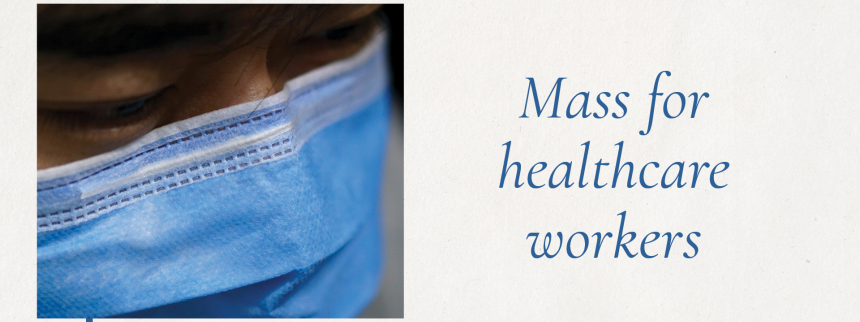
On Friday, May 15, Bishop Jaime Soto celebrated a Mass in thanksgiving for the service of all healthcare workers and for their continued health and safety. (For a full replay of the Mass, click here.) Below is the homily from the Mass:
The words from the fifteenth chapter of the gospel according to John are some of the most tender and personal words the Lord Jesus addressed to his disciples. I invite you to find a quiet moment when you can let these words of Jesus seep into your soul. “I have called you friends.”
Jesus said these words to his friends on the night before he died. He was sitting at table with them trying to prepare them for what was to unfold later that evening and in the grueling saga that would be remembered forever as “Good Friday”.
We were not at the table that evening but have the perspective of time to know the full weight of Jesus’ words to his then small band of companions. “No one has greater love than this, to lay down one’s life for one’s friends. You are my friends.” By calling them “friends” he indicated he was prepared to suffer and die for them.
The COVID-19 pandemic has confined a large segment of California to their homes or severely restricted their movements, necessarily so. The men and women in health care have assumed precautions designed, not to distance themselves, but to keep them close to those who are afflicted with the coronavirus. The protocols of protection are required because the care is so necessary. The nearness to those who suffer is needed. Caution is taken so that care can be provided, closely and compassionately.
The anxiety for one’s safety is tugged by the agony of those afflicted. From this very anguishing tension emerges a face of humanity and a glimmer of divinity that is only seen in suffering. The closeness reveals a vulnerability that is shared. The commonality is uneasy yet essential to bring comfort and healing. Those who closely care choose to endure this tension, not only because the care is needed; the human bond forged in suffering is mutually redeeming. This anguished bond between the infirmed and the caregiver dissolves differences and becomes a revelation of communion.
Pope Francis has spoken repeatedly of the need to foster a culture of encounter. There are few circumstances where both the strain and the grace of such human encounters are more readily apparent than the many ways men and women provide health care in our communities today. Though we long for a time when these desperate and difficult measures will not be necessary, we should not too quickly ignore the transforming opportunities for a more enduring communion of life emerging from the daily distressing consequences of this pandemic. The courage and constancy of care provided by many of you and your co-workers encourages hope in all of us. While the demands of physical-distancing continue your example of care challenges us to reject the moral-distancing of indifference. The communion of sacrifice offered by many of you offers a cure for more than just the coronavirus.
Jesus forged a deep bond of friendship with his disciples through his suffering on the cross. The disciples discovered in the suffering Christ an eternal friend and companion.
May the merciful Lord bring an end to this pandemic. Until that moment, may the friendship of the Lord Jesus grant all of you patience and perseverance in your endeavors. Through the many trials and tribulations of these days Christ will be our good shepherd and our good friend leading us to a greater communion with one another.

